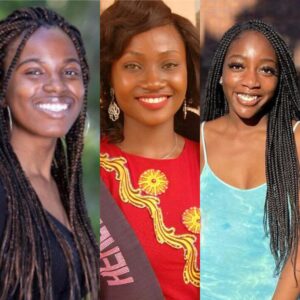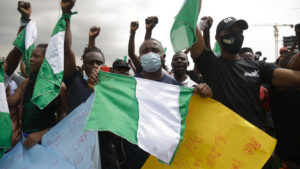
Adaobi Okolocha, Eniola Bada and Juliana Olodude are three out of the millions of young Nigerians who are currently fighting to end police brutality and violence inflicted upon their community by the ones whose job is to protect it.
After a video of a civilian being killed by the police’s Special Anti-Robbery Squad (SARS) circulated on social media in early October, furious Nigerians marched en masse chanting “Enough is enough” in the battle to end police brutality and harassment of the youth.
However, the peaceful protests in Nigeria soon turned into the Lekki massacre on the night of Oct. 20, killing 38 people across the country, forcing millions worldwide to witness the current events taking place in Nigeria, according to multiple published reports.
“I told a friend today that it feels like I’m in a war zone. The younger generation is why we’re even having this conversation,” said Bada, a 25-year-old living in Lagos, Nigeria. “A lot of people are tired. How can my country be out to kill me? A young man tweeted yesterday, ‘Nigeria will not end me.’ He died barely three hours later. He was killed by hoodlums/law enforcement.”
Amnesty International has recorded 82 police brutality reports between 2017 and 2020 in Nigeria. As young people under 30 form more than 40% of Nigeria’s population, it appears SARS views this particular demographic as an easy target, especially young Nigerian men.
Imagine being arrested, profiled or even killed for having the latest iPhone or wearing an expensive item — by a police officer who is meant to protect you from that exact situation. This is what Bada’s little brother and countless other Nigerians are currently facing and daily protesting against even when their lives are at stake.
“My brother was harassed on his way home from school. He usually dresses extra conservatively while traveling because of SARS,” said Bada, an Ilorin University graduate. “That day, he didn’t take off his necklace and was asked to come down from the bus he was in. They went through everything. His phone, chats, accounts, laptops … everything. It was a WhatsApp group where he teaches his classmates that made them let him go because he seemed like a good boy.”
Adaobi Okolocha, a FAMU biology pre-medicine student, also had a similar experience with her brother when she visited Nigeria.
“I recall one time when my family was stopped because they [SARS] said they were looking for someone, and they held us up even when my parents showed them their ids,” the third-year student said. “They still didn’t let us go, and one of the police tried to force my brother out of the car. Only when we gave them money, they let us go … It seems like it’s all about power and who they can control.”
However, SARS — a unit created in 1992 to combat armed robbery and stop crimes with extensive powers — isn’t the only group that created deadly protests in Nigeria.

Since the start of the “End SARS” protests, 56 people have died across Nigeria. With these unforeseen events, Florida A&M University student Olodude worries about visiting her Nigerian community for the first time in the summer because of the risk of being interrogated by SARS.
“The only reason I would say it makes me fearful is because now it’s like there are looking at everybody as the same. My fear is you [SARS] are going to see me and see me with money, the same way how those kids have money, and still assume how they been assuming this entire time.”
Olodude also believes Americans aren’t speaking up enough about the “End SARS” movement in comparison to the Black Lives Matter movement because it doesn’t affect America.
“People [African-Americans] think it has nothing to do with them, and if you ask me, it really bothers me. A lot of people want to take from the culture, but when it’s time to speak up about certain things, it’s like people pick and choose when they want to support a country and that honestly bothers me.”
All of these three young Nigerian women, and many others, want the same attention and support for their community because almost every country is fighting the same battle of injustice.
“I think that the most important thing to realize is this is still the Black Lives Matter movement. I don’t know why there has been a sudden spike. However, I’m honestly grateful it is happening. Because now we are not only raising awareness for Black people here but all over the globe, and that’s honestly amazing because Black Lives Matter everywhere,” Okolocha said.
As hearings of the killings of Nigerian protesters began on Tuesday, people continue to fight in solidarity to stop the battle of police brutality happening in Nigeria and worldwide.